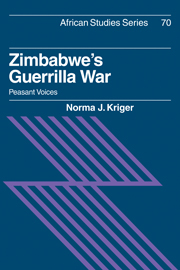Book contents
- Frontmatter
- Contents
- List of maps
- Acknowledgements
- Introduction
- 1 Peasant revolutions: theories and methods
- 2 Inequalities and peasant grievances
- 3 Strategies, goals and appeals: continuity and change
- 4 Guerrilla–civilian relations: the issue of popular support
- 5 Struggles in the struggle
- 6 Legacies of the war for peasants
- 7 Conclusion
- Appendix: Field research
- Notes
- Bibliography
- Index
- Other books in the series
5 - Struggles in the struggle
Published online by Cambridge University Press: 05 January 2012
- Frontmatter
- Contents
- List of maps
- Acknowledgements
- Introduction
- 1 Peasant revolutions: theories and methods
- 2 Inequalities and peasant grievances
- 3 Strategies, goals and appeals: continuity and change
- 4 Guerrilla–civilian relations: the issue of popular support
- 5 Struggles in the struggle
- 6 Legacies of the war for peasants
- 7 Conclusion
- Appendix: Field research
- Notes
- Bibliography
- Index
- Other books in the series
Summary
This chapter is about struggles inspired by agendas other than African nationalism and African majority rule that were central for the guerrillas and the parties they represented. Sometimes they converged with the guerrilla agenda; othertimes they were in conflict with guerrilla goals. The theme of revolution(s) within a revolution occupies a prominent place in the literature on revolutions. An example is Debray's Revolution in the Revolution? that addresses ideological and strategic disputes about how to bring about revolution in Latin America. It is intended to discredit Marxist–Leninist communist parties in Latin America for failing to bring about revolutionary change. Debray rejects the Leninist concept of a vanguard party providing revolutionary leadership as inappropriate for Latin American conditions and popularizes instead the lessons he has drawn from the Cuban revolution. He begins by denying political agitation a role in the first stage of revolutionary guerrilla war and advocating propaganda through armed action. This is tantamount to abrogating the leadership role of the party and is heresy to Marxist–Leninists. He goes on to attack directly the role of communist parties in Latin America and claims that they have unwittingly played a counter-revolutionary role by creating obstacles for the guerrillas. Communist parties do not devote their full energies to military struggle but try to maintain several forms of struggle including legal struggle in the city which he regards as incompatible with armed struggle.
- Type
- Chapter
- Information
- Zimbabwe's Guerrilla WarPeasant Voices, pp. 170 - 211Publisher: Cambridge University PressPrint publication year: 1991

